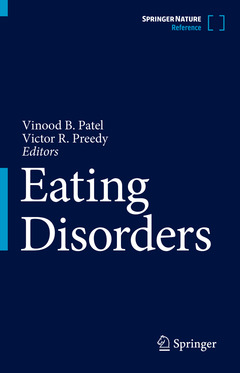Eating Disorders, 1st ed. 2023
Coordonnateurs : Patel Vinood B., Preedy Victor R.

Victor R. Preedy BSc, PhD, DSc, FRSB, FRSPH, FRCPath, FRSC is Emeritus Professor of Nutritional Biochemistry at King's College London. He is also Professor of Clinical Biochemistry and Pathology at Kings College Hospital (Hon) and Honorary Professor at the University of Hull. He was Director of the Genomics Centre of King's College London from 2003 to 2020. Professor Preedy with an Honours Degree in Biology and Physiology with Pharmacology. He gained his University of London PhD on protein me
Reviews integrative assessment strategies and treatment approaches
Considers the concept of food addiction in research, clinical treatment, and policy
Focuses on the psychiatric, medical, and nutritional management of severely ill patients
Date de parution : 03-2023
Ouvrage de 1565 p.
15.5x23.5 cm



